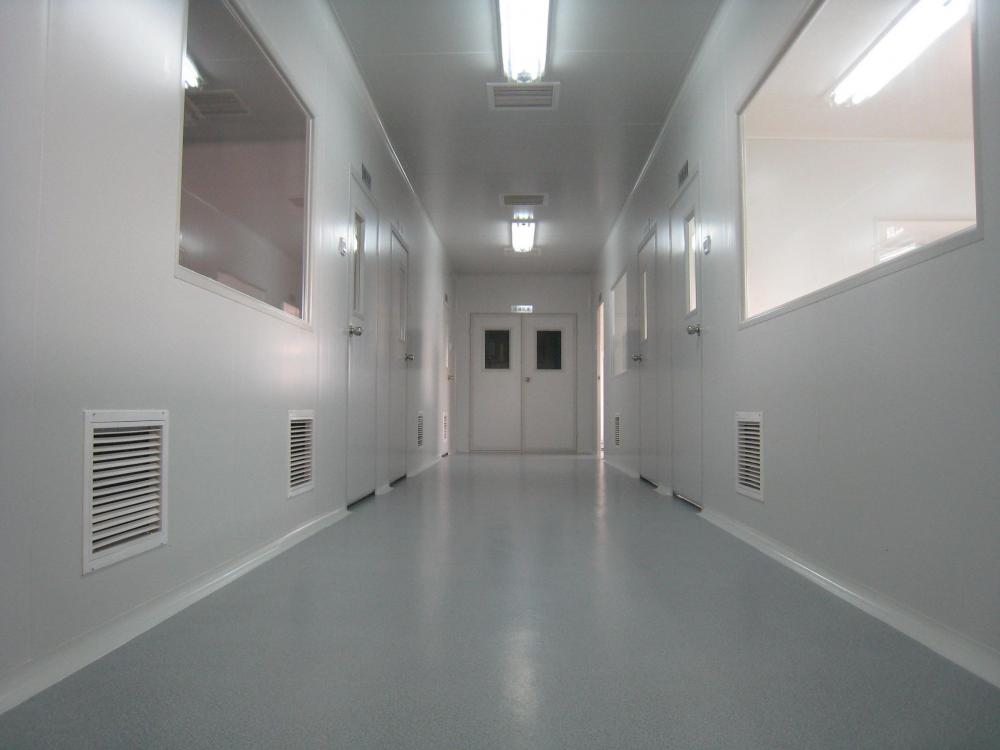
Privacy statement: Your privacy is very important to Us. Our company promises not to disclose your personal information to any external company with out your explicit permission.
News
2024-07-17

The Pharmaceutical Production Clean Workshop is meticulously designed with several critical components to maintain stringent cleanliness standards:
1. HVAC (Heating, Ventilation, and Air Conditioning) System:
o HEPA Filters: High-Efficiency Particulate Air (HEPA) filters are integral to the HVAC system, removing airborne particles as small as 0.3 microns with high efficiency.
o Positive Pressure: Maintains positive air pressure relative to adjacent areas to prevent contaminants from entering the cleanroom.
2. Cleanroom Structure and Design:
o Wall and Ceiling Panels: Constructed from smooth, non-shedding materials such as stainless steel or fiberglass-reinforced plastic (FRP) to minimize particle generation.
o Sealed Construction: Minimizes seams and joints to prevent particle accumulation and facilitate easy cleaning.
o Flooring: Seamless and chemically resistant materials like epoxy or vinyl to ensure cleanliness and durability.
3. Personnel Entry and Gowning Area:
o Airlocks: Entryways equipped with airlocks to control airflow and reduce the introduction of contaminants.
o Gowning Room: Dedicated area where personnel don sterile garments, including coveralls, hoods, masks, gloves, and shoe covers, to minimize human-borne contaminants.
4. Environmental Monitoring Systems (EMS):
o Particle Counters: Continuously monitor airborne particle levels to ensure compliance with cleanliness standards.
o Temperature and Humidity Controls: Maintain stable environmental conditions to support pharmaceutical manufacturing processes.
5. Utility Services:
o Clean Utilities: Dedicated systems for purified water, compressed air, and gases that meet pharmaceutical-grade standards to prevent contamination of products.
o Electrical Systems: Designed with redundant power supplies and backup systems to ensure uninterrupted operation.
1. Sterile Manufacturing:
o Injectables and Infusions: Producing sterile drugs, including injectables, infusions, and parenteral solutions, where contamination could pose serious health risks to patients.
o Aseptic Processing: Handling aseptic processing of pharmaceuticals where maintaining sterility throughout the production process is essential.
2. Sensitive Formulations:
o Biologics and Vaccines: Manufacturing biologics, vaccines, and sensitive biological products that require stringent environmental controls to maintain product efficacy and safety.
o High-Potency Drugs: Handling high-potency drugs or active pharmaceutical ingredients (APIs) that require protection from cross-contamination and environmental exposure.
3. Research and Development (R&D):
o Clinical Trials: Supporting R&D activities and clinical trials by providing controlled environments for drug formulation development and testing under strict regulatory compliance.
 Advantages
AdvantagesThe Pharmaceutical Production Clean Workshop offers significant advantages:
1. Maintaining Product Purity:
o Contamination Control: Minimizes airborne particles, microbes, and other contaminants that could compromise product integrity during manufacturing.
o Sterile Environment: Essential for producing sterile drugs, vaccines, and biologics where even trace amounts of contaminants can affect product safety and efficacy.
2. Ensuring Regulatory Compliance:
o Adherence to Standards: Meets stringent regulatory requirements such as Good Manufacturing Practice (GMP) and international cleanliness classifications (ISO 14644).
o Validation and Documentation: Regular validation of cleanliness levels and environmental monitoring ensures compliance with regulatory guidelines and industry standards.
3. Enhancing Operational Efficiency:
o Reduced Risk of Batch Failures: Minimizes the risk of batch failures due to contamination, leading to fewer production interruptions and rejections.
o Optimized Processes: Provides a controlled environment for efficient production processes, resulting in consistent product quality and faster turnaround times.
4. Improved Workplace Safety:
o Hazardous Material Handling: Safely handles hazardous materials and potent compounds, protecting personnel from exposure risks.
o Behavioral Controls: Strict gowning procedures and controlled access protocols minimize human-borne contamination, ensuring a safer work environment.
Effective maintenance and care practices are crucial for the sustained performance of Pharmaceutical Production Clean Workshops:
1. Routine Cleaning Protocols:
o Surface Cleaning: Implement regular cleaning schedules for all surfaces, including walls, floors, ceilings, and equipment. Use recommended disinfectants and cleaning agents that are compatible with cleanroom materials.
o Equipment Cleaning: Clean and sanitize production equipment, including stainless steel furniture, processing machines, and utility systems, to prevent particle accumulation and microbial growth.
2. HVAC System Maintenance:
o Filter Replacement: Regularly replace HEPA filters and pre-filters according to manufacturer specifications and environmental monitoring results. Maintain filter integrity to ensure optimal air quality and particle removal efficiency.
o Airflow and Pressure Checks: Conduct routine checks of airflow patterns and positive pressure levels to verify proper ventilation and contamination control.
3. Environmental Monitoring Systems (EMS):
o Continuous Monitoring: Install and maintain EMS for real-time monitoring of air quality, temperature, humidity, and particle counts within the cleanroom environment.
o Calibration and Validation: Calibrate monitoring instruments regularly and validate EMS performance to ensure accurate data collection and compliance with regulatory standards.
4. Gowning and Personnel Practices:
o Gowning Procedures: Enforce strict gowning protocols for personnel entering the cleanroom area, including the use of sterile garments, masks, gloves, and shoe covers.
o Behavioral Controls: Implement behavioral controls such as restricted movements and designated entry/exit procedures to minimize contamination risks from personnel.

The Pharmaceutical Production Clean Workshop is indispensable in modern pharmaceutical manufacturing for ensuring the production of safe, high-quality drugs. By integrating advanced technologies, stringent protocols, and meticulous maintenance practices, these facilities uphold the highest standards of cleanliness and operational excellence. Their critical role in sterile manufacturing, sensitive formulations, and R&D underscores their pivotal contribution to pharmaceutical innovation and patient safety worldwide. As pharmaceutical advancements continue, clean workshops will remain essential for maintaining product integrity and regulatory compliance in the global healthcare industry.
Share to:

Privacy statement: Your privacy is very important to Us. Our company promises not to disclose your personal information to any external company with out your explicit permission.

Fill in more information so that we can get in touch with you faster
Privacy statement: Your privacy is very important to Us. Our company promises not to disclose your personal information to any external company with out your explicit permission.